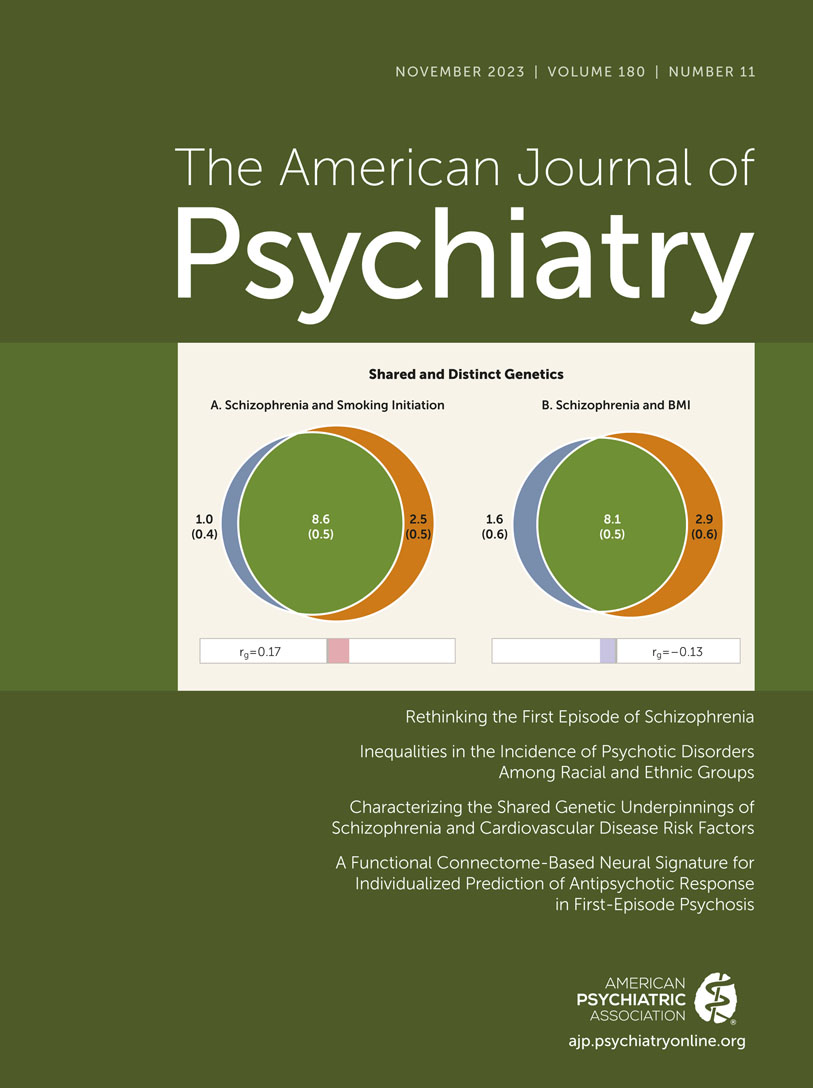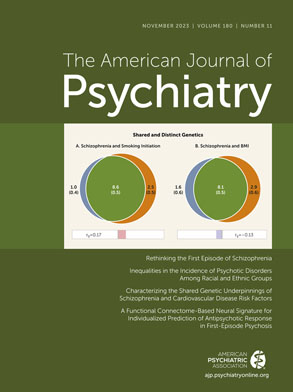In this issue of the
Journal, Cao and colleagues (
1) present results of a new method for using functional connectivity to predict antipsychotic medication response. This method combines connectivity measures collected under multiple brain states (resting state and task based) and examines the entire brain connectome. The authors propose that by potentially improving predictive power, their work represents an important step toward precision psychiatry. Many other approaches have been used previously to predict response to antipsychotic medication, including genetics, epigenetics, metabolomics, magnetic resonance spectroscopy measurement of glutamate and other markers, and brain morphometric analysis (
2–
5). All of these approaches have produced statistically significant findings but have fallen short of ushering in personalized medicine, for several reasons. First, it is not enough to find a statistically significant difference between groups or a significant correlation between a biomarker and degree of response; the precision of this result must be meaningful on the level of individual patients (e.g., with strong sensitivity/specificity) to inform clinical decisions. Second, with the important exception of clozapine, we don’t have options for treatments that act via different mechanisms. Since all antipsychotics other than clozapine share similar mechanisms of action, until additional treatments based on novel mechanisms are available, a predictor of response will likely be limited to guiding the decision on whether or not to treat the patient’s disorder pharmacologically. A decision to decline to offer a first-episode psychosis patient a trial of an antipsychotic would need to be based on a predictive test with an extremely low likelihood of producing a false negative result. While limited in their current clinical utility, these methods may identify biological targets and clinical subtypes that facilitate the development of new treatments.
The authors’ connectomic approach to predict pharmacologic treatment response using measures of functional connectivity follows from accumulating evidence supporting it. While it may seem surprising that medication response, which is a molecular process, would be predicted by functional connectivity, which is a measure of the synchronization of fluctuations in blood oxygenation across brain regions, a recent meta-analysis of functional connectivity studies found a sensitivity of 81% and specificity of 76% for predicting antipsychotic response (
6). In a previous study, Cao et al. (
7) collected functional MRI (fMRI) data during four memory tasks and during resting state in eight healthy individuals and found that accuracy in identifying the data of individual participants (intersubject variability) on the basis of functional connectivity increased with the number of data sets included and was more stable with an increasing number of measures. Task-based measures enhanced performance of the “cross-paradigm connectivity” estimate more than did resting-state measures (
7).
In the present study, Cao et al. measured functional connectivity during resting state and during four different memory tasks in 49 patients with a first episode of psychosis who had taken antipsychotic medication for less than 2 weeks. Using principal components analysis, they created a connectome-wide profile for each participant and used machine learning to select components predictive of response of psychotic symptoms to either risperidone or aripiprazole over 12 weeks, as measured by the Brief Psychiatric Rating Scale. They then examined generalizability in a validation sample of 24 patients. The performance of the connectome-wide cross-paradigm measure was evaluated as the correlation between predicted and observed slopes of treatment response. Performance results were statistically significant, with correlation coefficients (r) of 0.41 and 0.47 for the discovery and validation samples, respectively. Lower connectivity between cerebellum and cerebral cortex and higher connectivity between cerebral cortical areas predicted greater response. While estimates of treatment response were on average within 1.6 points of observed treatment response at week 12, Figure 3 in the article displays a degree of scatter suggesting that the clinical utility of this measure is currently limited. In addition, predicted slopes did not differ between risperidone and aripiprazole, consistent with the expectation that this biomarker is unlikely to guide selection between agents.
This study is valuable in introducing a new approach that may advance prediction of response to antipsychotics by combining fMRI data obtained under multiple conditions, although the authors do not show whether the additional task-based measures contributed to increasing accuracy. The identification of nodes in the cerebellum and cortex most strongly associated with treatment response may also contribute to circuit-based models of psychosis and pharmacologic treatment mechanisms. Whether the associations between functional connectivity measures at baseline and treatment response are causal remains to be established. For example, because this study included individuals with a range of diagnoses that would be expected to exhibit different responses to antipsychotics, connectivity between specific nodes predictive of response may reflect circuit features of different diagnoses and not circuits responsible for medication effects. The demonstration in future studies that functional connectivity measures change in step with treatment response will be of interest and may strengthen claims of a causal relationship. While some issues remain to be addressed by larger studies, this work lays the groundwork for a promising application of fMRI to an important clinical question in the initial treatment of patients with psychotic disorders.

